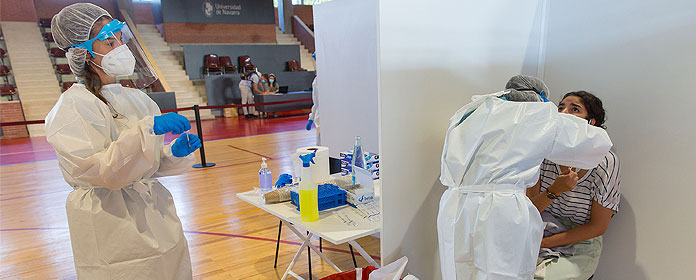2020_09_14_pruebas-PCR-final
The University performs a total of 11,000 PCRs on its students and employees and detects 55 positive results.
Experts from the academic center value the implementation of these mass tests. "It is a starting point. It is necessary to continue to strictly comply with prevention and hygiene measures," they emphasize.

The University of Navarra has performed a total of 11,000 PCR tests on its students and employees since August 24. The issue number of positives is 55, of which 7 have already been discharged. Also, 153 people are currently in isolation.
This is one of the main measures of the plan designed by the academic center to guarantee a safe campus and ensure the health of students and the staff. More than 40 professionals from the biosanitary field of the University of Navarra have worked in the realization and analysis of about a thousand daily tests, coinciding with the beginning of the course. The tests began on August 24 with the on-site incorporation of the workers and continued the following weeks, after the arrival of the 8,700 students from Degree.
Dr. Alejandro Fernández Montero, from the Joint Service of Health & Safety Office - area COVID-19, has highlighted the importance of this measure, since it has allowed "to stop the transmission of Covid, in the university community and in Navarra, of 55 people who were unaware of their ability to infect and have in turn generated a average of more than three close contacts in the university environment". In addition, "the epidemiological data collected in this first screening will help us to identify behaviors, lifestyles and areas of social relationships at risk of acquiring the disease. And consequently, act on them."
Dr. Fernández Montero explains why the University of Navarra chose to perform PCR on the entire university community: "It is the test that tests positive the earliest. This allows, in addition to an early diagnosis of the disease, the application of isolation measures so that the patient does not infect other people and the search for close contacts to stop its spread".
He also stresses that "the University went from a zero risk, being closed in summer, to hosting a population of 11,000 people from more than 60 countries and from all regions of Spain, with an enormous capacity for socialization, such as young university students". According to him, it was necessary to quantify and analyze this "new risk" in order to assess the prevention measures implemented and incorporate new ones.
200 random PCRs per weekHowever, he warns that as long as the disease does not disappear, it is advisable to carry out random sampling. In fact, the University of Navarra will perform about 200 PCRs per week to a representative sample to get an idea of the evolution of the infection and detection of new foci of contagion. "If we are prepared and act at the first signs of the risk of a resurgence, we can live with the disease. By protecting the most vulnerable, with preventive and early diagnosis tools, and with therapeutic advances, we can maintain an active society with satisfactory control of COVID-19 disease until the arrival of a possible vaccine," he continues.
Sara Martínez Solchaga, director of the University of Navarra's Joint Occupational Risk Service, stresses the importance of this initial screening at the beginning of the academic year and insists on the need not to relax and to continue complying with the prevention and hygiene measures established by the health authorities and the academic center.
"The University of Navarra has invested a lot of effort, and also resources, to adapt the campus to the current circumstances, with remodeling of spaces, signage, reinforcement of cleanliness, and of course, PCR testing to all. Now we cannot throw away all that work.", he explains. In addition to the random PCRs, he adds, "employees and students must not let their guard down and be responsible, both inside and outside the campus, and respect the measures, so that academic life continues in a face-to-face manner, as far as possible. Likewise, all these decisions taken to safeguard the health of the university community have a direct impact on the social environment".

